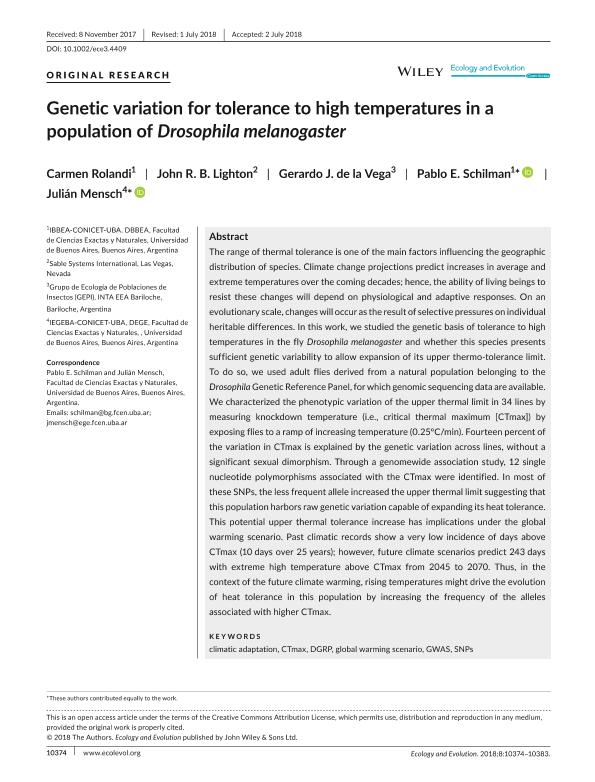Artículo
Genetic variation for tolerance to high temperatures in a population of Drosophila melanogaster
Rolandi, Carmen ; Lighton, John R. B.; de la Vega, Gerardo José
; Lighton, John R. B.; de la Vega, Gerardo José ; Schilman, Pablo Ernesto
; Schilman, Pablo Ernesto ; Mensch, Julian
; Mensch, Julian
 ; Lighton, John R. B.; de la Vega, Gerardo José
; Lighton, John R. B.; de la Vega, Gerardo José ; Schilman, Pablo Ernesto
; Schilman, Pablo Ernesto ; Mensch, Julian
; Mensch, Julian
Fecha de publicación:
07/2018
Editorial:
Wiley Blackwell Publishing, Inc
Revista:
Ecology and Evolution
ISSN:
2045-7758
Idioma:
Inglés
Tipo de recurso:
Artículo publicado
Clasificación temática:
Resumen
The range of thermal tolerance is one of the main factors influencing the geographic distribution of species. Climate change projections predict increases in average and extreme temperatures over the coming decades; hence, the ability of living beings to resist these changes will depend on physiological and adaptive responses. On an evolutionary scale, changes will occur as the result of selective pressures on individual heritable differences. In this work, we studied the genetic basis of tolerance to high temperatures in the fly Drosophila melanogaster and whether this species presents sufficient genetic variability to allow expansion of its upper thermo-tolerance limit. To do so, we used adult flies derived from a natural population belonging to the Drosophila Genetic Reference Panel, for which genomic sequencing data are available. We characterized the phenotypic variation of the upper thermal limit in 34 lines by measuring knockdown temperature (i.e., critical thermal maximum [CTmax]) by exposing flies to a ramp of increasing temperature (0.25°C/min). Fourteen percent of the variation in CTmax is explained by the genetic variation across lines, without a significant sexual dimorphism. Through a genomewide association study, 12 single nucleotide polymorphisms associated with the CTmax were identified. In most of these SNPs, the less frequent allele increased the upper thermal limit suggesting that this population harbors raw genetic variation capable of expanding its heat tolerance. This potential upper thermal tolerance increase has implications under the global warming scenario. Past climatic records show a very low incidence of days above CTmax (10 days over 25 years); however, future climate scenarios predict 243 days with extreme high temperature above CTmax from 2045 to 2070. Thus, in the context of the future climate warming, rising temperatures might drive the evolution of heat tolerance in this population by increasing the frequency of the alleles associated with higher CTmax.
Palabras clave:
CLIMATIC ADAPTATION
,
CTMAX
,
DGRP
,
GLOBAL WARMING SCENARIO
,
GWAS
,
SNPS
Archivos asociados
Licencia
Identificadores
Colecciones
Articulos(OCA CIUDAD UNIVERSITARIA)
Articulos de OFICINA DE COORDINACION ADMINISTRATIVA CIUDAD UNIVERSITARIA
Articulos de OFICINA DE COORDINACION ADMINISTRATIVA CIUDAD UNIVERSITARIA
Citación
Rolandi, Carmen; Lighton, John R. B.; de la Vega, Gerardo José; Schilman, Pablo Ernesto; Mensch, Julian; Genetic variation for tolerance to high temperatures in a population of Drosophila melanogaster; Wiley Blackwell Publishing, Inc; Ecology and Evolution; 8; 21; 7-2018; 10374-10383
Compartir
Altmétricas



